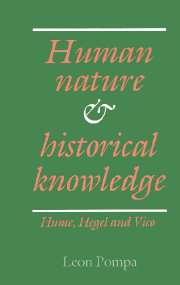1 - HUME: THE CONSTANCY OF HUMAN NATURE
Published online by Cambridge University Press: 31 October 2009
Summary
INTRODUCTION
My aim in this chapter is two-fold: to explore Hume's theory of historical knowledge and its relationship to his conception of human nature, and to develop a critique of its implications, and that of similarly orientated theories, for the possibility of such knowledge. In any discussion of Hume's philosophy, however, it is necessary to contend with the fact that his thought is both so complex and comprehensive, at least in its intentions, that in very few areas of it is there much unanimity of interpretation. This is not because there are not many passages in which he appears to express himself clearly, but rather because, as a result of the variety of subjects with which he deals, the interpretation of his theories in one area is inevitably affected by apparently different remarks which he makes about them in the context of his treatment of other subjects. There is thus a continuous difficulty about how much weight to attach to what he says in those passages in which he is directly concerned with some specific topic – say causation – and how this should be modified by remarks which he makes about it in some different but connected context – in the case of causation, say, when he discusses it in connection with his theory of belief. One line of approach has been to assume that he is intent upon developing a systematic programme, the logical structure of which is reflected in the order in which he sets out the main topics to be discussed.
- Type
- Chapter
- Information
- Human Nature and Historical KnowledgeHume, Hegel and Vico, pp. 13 - 66Publisher: Cambridge University PressPrint publication year: 1990

